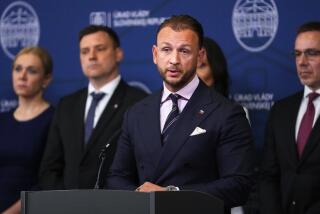Serbs Rally Around Their Leader
- Share via
BELGRADE, Yugoslavia — If NATO had hoped to drive a wedge between Yugoslav President Slobodan Milosevic and his people with the alliance’s punishing bombardment of their country, the opposite appeared to be true Thursday.
Early indications here in the Yugoslav capital were that Serbs, united in their anger against the attacks, were rallying around Milosevic. Even people who had been anti-Milosevic said that, faced with foreign attack, their patriotism as Serbs came first.
At the Moment Cafe, in a quiet, tree-studded section of Belgrade, a man who gave his name as Srdjan said that he had once marched in opposition to the Yugoslav leader but that the bombings to force peace in the secessionist Serbian province of Kosovo had changed all that--for now, at least.
“For years I have been anti-Milosevic. Today I cannot be anymore,” he said. “There is no point in being anti-Milosevic anymore. Someone is attacking the country.
“Everybody here [at the Moment Cafe] was part of those [anti-Milosevic] demonstrations two years ago. I was demonstrating for 60 days. I am still against government policy, but we have gone beyond government policy now. This is war.”
Mirko Malikovic, a 34-year-old construction worker, agreed.
Describing his own support for Milosevic, he said: “It’s going up. He’s defending his people.”
As he ate a ham sandwich at a Belgrade work site, Malikovic lashed out at President Clinton.
“That sexual maniac thinks he’s the boss of the house,” he said, “but he’s not.”
He quoted part of a Serbian proverb, saying, “A bear will dance in front of his house”--the implication being that a bear in your neighbor’s yard will soon be at your door. “We also have weapons and means. We can react.
“Clinton didn’t succeed in Somalia when they were killing Americans on the street,” he said, referring to the ill-fated U.S. mission of 1992-93 that left 42 Americans dead. “We will do the same. The people who fall from the plane: We will find them.”
Anti-American sentiment appeared to be growing in Belgrade.
“I was working for Pan-American [Airlines], and I hate them now. . . . I finished 10 years ago,” said a woman in her 30s who didn’t want to give her name.
Asked what went wrong that could have led to the bombing, she said, “I have no feeling,” broke into tears and walked away.
Snezana Kuzmanovic, 36, who was trained as a civil engineer but works in a Belgrade shawl shop, said: “Yesterday I still had positive feelings about Americans. . . . Now [look] what they are doing to us. For me it is not important who is guilty. Now, if people are dying, it’s not important where the crime is.
“We are so small. We cannot do anything against America and the world. We want to find a solution.
“We didn’t attack anyone. If you want our territory--it’s our territory. Kosovo is not in Albania. We didn’t attack anyone. It’s clear aggression, that someone’s attacking a state. Who are they to attack our people? We are attacked. We must support our country, that’s all. They attack me. They attack my child. We live in Yugoslavia. You can’t occupy a country if you live in that country.”
Asked why Kosovo means so much to her countrymen, Kuzmanovic said: “It’s very important for Serbian people. It’s our history. If they [the ethnic Albanians of Kosovo] don’t like it, they have their own country. This is our country. We don’t have anyplace else. . . . We think we are normal people. I think the whole of Yugoslavia thinks like this.”
Srdjan, the coffee drinker at the Moment Cafe, predicted that Belgrade will adjust to the bombing and carry on.
“Even if you have cancer, which I don’t wish you at all,” he said, “after a week you will get used to having cancer.”
More to Read
Sign up for Essential California
The most important California stories and recommendations in your inbox every morning.
You may occasionally receive promotional content from the Los Angeles Times.












